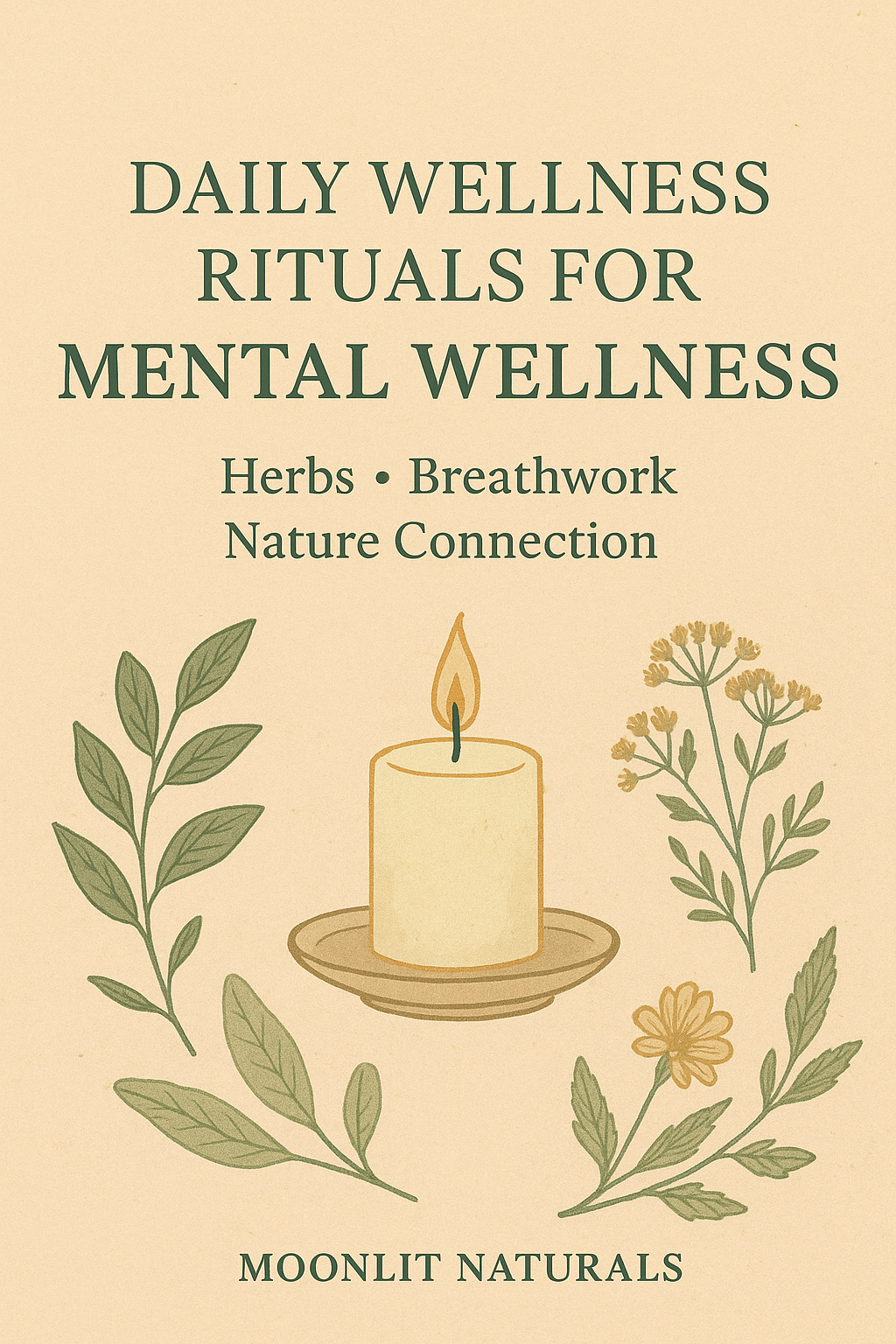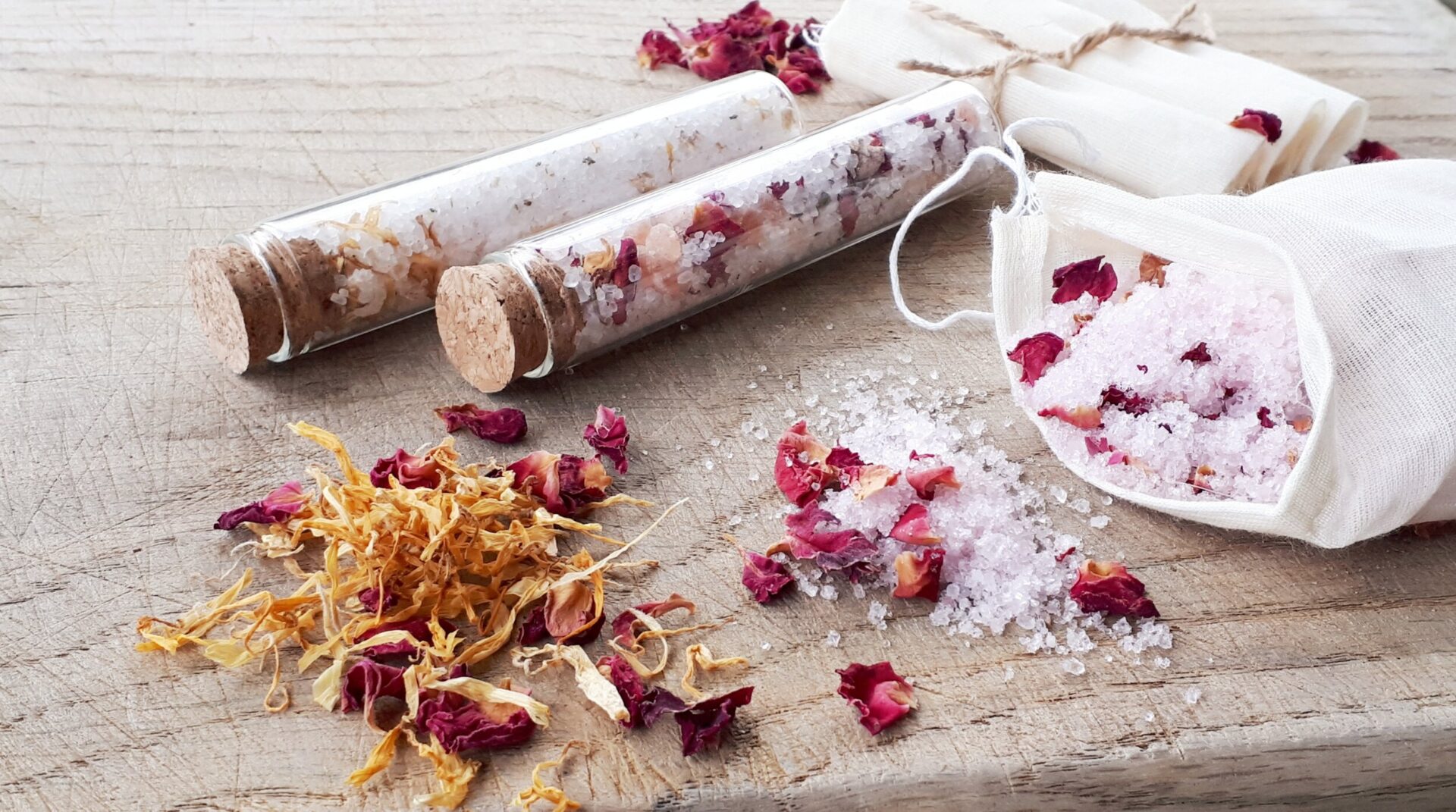Introduction: The Need for Ritual in a Busy World
Life in the UK is more fast-paced than ever. From juggling work, home, and digital distractions to managing the ongoing stressors of modern living, many people are searching for ways to bring balance back into their days. Mental wellness has become a growing focus, not just for those facing anxiety or stress, but for anyone wishing to live more mindfully.
One of the most effective approaches lies in ritual. Creating simple, daily wellness rituals—rooted in herbs, breathwork, and connection with nature—can help regulate the nervous system, restore calm, and encourage resilience. At Moonlit Naturals, we believe in the wisdom of traditional remedies blended with mindful practices, helping you reconnect with natural rhythms and embrace holistic wellbeing.
This blog explores how you can design your own daily rituals to support mental wellness, with practical advice and herbal allies that make a difference.
Why Rituals Matter for Mental Wellness
Modern psychology and ancient traditions agree: rituals are powerful. They bring structure, calm, and intention to daily life. Unlike routines, which are often automatic, rituals are mindful practices done with awareness. This simple shift in intention can transform even ordinary moments into healing ones.
Research shows that consistent wellness practices:
- Lower cortisol (the stress hormone)
- Improve focus and memory
- Reduce anxiety and symptoms of depression
- Support emotional regulation
When you begin your day with grounding rituals, you set the tone for calm. When you end your day with restorative practices, you signal to your body and mind that it is safe to rest. Over time, these small acts accumulate, creating resilience and balance.
Herbal Allies for Calm and Clarity
For centuries, herbs have supported mental wellness. Many plants used in traditional remedies are now backed by scientific research, showing their ability to soothe the nervous system, improve mood, and promote mental clarity. Here are five powerful herbs to consider weaving into your daily rituals:
1. Lemon Balm (Melissa officinalis)
Known as the “herb of joy,” lemon balm has been used since the Middle Ages to lift the spirits and calm the mind. Modern studies show it helps reduce anxiety and improve sleep quality. A few drops of lemon balm tincture in water or tea can ease tension and create a gentle sense of wellbeing.
[Internal link: Lemon Balm Tincture product page]
2. Skullcap (Scutellaria lateriflora)
Traditionally used by herbalists to calm racing thoughts and restlessness, skullcap is a valuable ally for those struggling with stress or overthinking. It can also support restorative sleep when taken as a tincture in the evening.
[Internal link: Skullcap Tincture product page]
3. Sage (Salvia officinalis)
Sage is not only a culinary herb but also a plant of clarity. Research suggests sage supports cognitive function and memory. Spiritually, it has long been used for cleansing and protection. Drinking sage tea or using a sage tincture before meditation can sharpen focus and clear mental fog.
[Internal link: Sage Tincture product page]
4. Thyme (Thymus vulgaris)
Thyme is rich in compounds that support both immunity and mood. Traditionally used to encourage courage and strength, it brings resilience during stressful times. It can be enjoyed as a tea or tincture and pairs beautifully with calming herbs like lemon balm.
5. Lion’s Mane Mushroom (Hericium erinaceus)
Though not a traditional UK herb, lion’s mane has gained attention for its powerful effects on brain health. Research suggests it supports neuroplasticity, focus, and long-term cognitive wellness. For those working through brain fog or fatigue, it makes a grounding addition to a daily ritual.
[Internal link: Lion’s Mane Tincture product page]
Together, these herbs provide a toolkit for calming the nervous system, supporting focus, and nurturing long-term mental wellness.
Breathwork: Ancient Practice for Modern Stress
Breath is life, yet most of us spend our days breathing shallowly, fueling tension and anxiety. Breathwork—deliberate control of the breath—has been practiced for thousands of years across cultures, from yogic pranayama to Buddhist meditation.
Modern research confirms what ancient healers knew: breathwork regulates the nervous system. By lengthening the exhale and slowing the rhythm, you activate the parasympathetic nervous system—the body’s “rest and digest” mode. This decreases stress hormones and increases feelings of calm.
A Simple Breathwork Ritual for Stress Relief
Try this practice once or twice a day, especially before stressful events or bedtime:
- Sit comfortably with your back straight.
- Inhale deeply through your nose for a count of 4.
- Hold the breath gently for a count of 2.
- Exhale slowly through your mouth for a count of 6.
- Repeat for 5–10 rounds.
For extra support, you can light a calming Moonlit Naturals candle beside you. The steady flame provides a point of focus, helping the mind stay present.
[Internal link: Moon-focused Candle product page]
Nature Connection as Medicine
Spending time in nature is one of the most powerful wellness tools available—and it is completely free. Practices like forest bathing (shinrin-yoku), eco-therapy, and grounding are becoming increasingly popular in the UK as people rediscover the benefits of slowing down outdoors.
Benefits of Time in Nature:
- Reduced cortisol and stress
- Improved concentration and creativity
- Enhanced mood and emotional balance
- Stronger immune system
Simple Ways to Reconnect with Nature Daily
- Take a 10-minute barefoot walk in your garden or local park.
- Sit quietly under a tree and notice the sounds around you.
- Keep a small indoor plant on your desk and tend to it mindfully.
- Incorporate natural elements into your rituals, such as flowers, stones, or leaves.
Pairing time outdoors with a calming herbal tea or tincture deepens the experience, creating a ritual that nourishes both body and spirit.
Creating Your Own Daily Wellness Ritual
Designing a daily ritual doesn’t need to be complicated. The key is to create a practice you can maintain, even on busy days. Start with small steps, layering herbs, breathwork, and nature connection into your life in ways that feel natural.
Morning Ritual
- Begin with a short breathwork session to clear your mind.
- Take a few drops of lion’s mane tincture to support focus and clarity.
- Step outside for fresh air, even if just for a few minutes.
Midday Reset
- Brew a tea with lemon balm or thyme to restore calm.
- Step away from screens and practice mindful breathing.
- Touch something natural—a stone, wood, or plant—to ground yourself.
Evening Ritual
- Light a Moonlit Naturals candle and dim the lights.
- Take skullcap tincture to ease tension and prepare for sleep.
- Journal three things you are grateful for, ending the day with a sense of peace.
Ritual Suggestion: A Calming Evening Practice
Here’s a simple ritual you can try tonight:
- Prepare Your Space
Choose a quiet area and light a Moonlit Naturals candle. Let the gentle glow set the mood. - Sip Herbal Support
Add a few drops of lemon balm tincture into warm water or tea. As you drink, breathe deeply and let your body relax. - Breathwork
Practice the 4-2-6 breathing pattern for five minutes, focusing on the flame as you exhale. - Gratitude Journaling
Write down three things that brought you comfort or joy today, no matter how small.
This practice takes less than 20 minutes yet has profound effects on mental wellbeing.
Conclusion: Embracing Balance with Rituals
Mental wellness is not about perfection. It is about creating small, intentional acts that help you feel grounded, connected, and calm. Herbs, breathwork, and time in nature are powerful tools available to all of us, and when woven into daily rituals, they can transform how we move through life.
At Moonlit Naturals, we honour these traditions by creating natural, cruelty-free remedies and ritual tools that support your journey. From herbal tinctures to candles and soaps, each product is designed to bring a little more balance and magic into your day.
🌿 Begin today with one small ritual—and watch how it grows into a practice of lasting wellbeing.
Need more information? Why not come and join our community?


